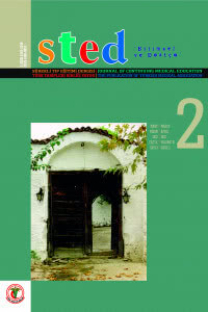Afyonkarahisar’da Hekimlerin ve Tıp Öğrencilerinin Mobil Sağlık Uygulamalarını Kullanımı ve Bu Konudaki Görüşleri
Mobile Health Practices by Physicians and Students of Medicine in Afyonkarahisar and their Opinions on the Issue
___
- 1. Yasini M, Marchand G. Mobile health applications, in the absence of an authentic regulation, does the usability score correlate with a better medical reliability? Studies in Health Technology Informatics 2015;216:127-31.
- 2. Steinhubl SR, Muse ED, Topol EJ. Can mobile health technologies transform health care? JAMA. 2013;310(22):2395-6.
- 3. Handel MJ. mHealth (mobile health)-using apps for health and wellness. Explore (NY) 2011;7(4):256- 61.
- 4. Liu C, Zhu Q, Holroyd KA, Seng EK. Status and trends of mobile-health applications for iOS devices: A developer's perspective. J. Syst. Software 2011;84(11):2022–33.
- 5. van Heerden A, Tomlinson M, Swartz L. Point of care in your pocket: a research agenda for the field of m-health. Bull World Health Organ 2012;90:393–4.
- 6.FDA. Mobile Medical Applications. Accessed June19, 2017, at http://www.fda.gov/MedicalDevices/DigitalHealth /MobileMedicalApplications/ucm255978.htm
- 7.Lee J. Hype or hope for diabetes mobile health applications? Diabetes Res Clin Pract 2014;106(2):390-2.
- 8. Kumar N, Khunger M, Gupta A, Garg N. A content analysis of smartphone-based applications for hypertension management. J Am Soc Hypertens 2015;9(2):130-6.
- 9. Yasini M, Marchand G. Toward a use case based classification of mobile health Applications. MIE 2015;210:175-9.
- 10.Payne KFB, Wharrad H, Watts K. Smartphone and medical related App use among medical students and junior doctors in the United Kingdom (UK): a regional survey. BMC Med Inform Decis Mak. 2012;30;12:121.
- 11. Masters K. Health professionals as mobile content creators: Teaching medical students to develop mHealth Applications. Medical Teacher 2014;36:883–9.
- 12. Morgan SE, King AJ, Ivic RK. Using new technologies to enhance health communication research methodology. In: Thompson TL, Parrott R, Nussbaum JF (eds), The Routledge handbook of health communication Newyork: Routledge 2011. p.578-592.
- 13. Shah J, Hag U, Bashir A, AslamShah S. Awareness of academic use of smartphones and medical apps among medical students in a private medical college? The Journal of the Pakistan Medical Association 2016;66(2):184-6.
- 14. O'Connor P, Byrne D, Butt M, Offiah G, Lydon S, Mc Inerney K, et al. Interns and their smartphones: use for clinical practice. Postgrad Med J 2014 Feb;90(1060):75-9.
- 15. M.H. Mobasheri, D. King, M. Johnston, S. Gautama, S. Purkayastha, A. Darzi, The ownership and clinical use of smartphones by doctors and nurses in the UK: a multicentre survey study, BMJ J Innov. 00 2015:1–8, http://dx.doi.org/ 10.1136/bmjinnov-2015-000062.
- 16. Koehler N, Vujovic O, McMenamin C: Healthcare professional’s use of mobile phones and the internet in clinical practice. Journal of Mobile Technology in Medicine. 2013;2:3-13.
- 17. Visvanathan A, Hamilton A, Brady RR. Smartphone apps in microbiology-is better regulation required? Clin Microbiol Infect 2012;18(7):E218-20.
- 18. Buchholz A, Perry B, Weiss LB , Cooley D. Smartphone use and perceptions among medical students and practicing physicians. Journal of Mobile Technology in Medicine 2016, 5(1):27-32.
- 19. Market Ranking 2015. Which EU countries are best for doing mHealth business. Accessed June19, 2017, at http://mhealtheconomics.com/
- 20. Ho K. Health-e-Apps: A project to encourage effective use of mobile health applications. BCMJ 2013;55:458-60.
- 21.Boruff JT, Storie D. Mobile devices in medicine: a survey of how medical students, residents, and faculty use smartphones and other mobile devices to find information. J Med Libr Assoc 2014 Jan;102(1):22-30.
- 22.Quant C, Altieri L, Torres J, Craft N. The SelfPerception and Usage of Medical Apps amongst Medical Students in the United States: A CrossSectional Survey, International Journal of Telemedicine and Applications, vol. 2016, Article ID 3929741, 5 pages, 2016. doi:10.1155/2016/3929741
- 23.Snashall E, Hındocha S The Use of Smartphone Applications in Medical Education. Open Medicine Journal, 2016;3:1.
- 24.Helf C, Hlavacs H. Apps for life change: Critical review and solution directions, Entertainment Computing, 2016;14:17-22.
- 25.Swan M. Health 2050: The realization of personalized medicine through crowdsourcing, the quantified self, and the participatory biocitizen. J. Pers. Med. 2012;2:93–118.
- 26. Walton G, Childs S, Blenkinsopp E. Using mobile technologies to give health students access to learning resources in the UK community setting. Health Info Libr J 2005; 22 Suppl 2:51-65.
- 27. Boulos MN, Brewer AC, Karimkhani C, Buller DB, Dellavalle RP. Mobile medical and health apps: state of the art, concerns, regulatory control and certification. Online J Public Health Inform 2014; 5(3):229.
- 28. Robinson T, Cronin T, Ibrahim H, Jinks M, Molitor T, Newman J, et al. Smartphone use and acceptability among clinical medical students: a questionnaire-based study. J Med Syst 2013 Jun;37(3):9936.
- 29. Tran K, Morra D, Lo V, Quan SD, Abrams H, Wu RC. Medical students and personal smartphones in the clinical environment: The impact on confidentiality of personal health information and professionalism. J Med Internet Res 2014;16(5):e132.
- 30.Yang YT, Silverman RD. Mobile health applications: the patchwork of legal and liability issues suggests strategies to improve oversight. Health Aff (Millwood) 2014;33:222-7.
- 31. Cortez NG, Cohen IG, Kesselheim AS. FDA regulation of mobile health technologies. N Engl J Med. 2014 Jul 24;371(4):372-9.
- ISSN: 1300-0853
- Yayın Aralığı: 6
- Başlangıç: 1992
- Yayıncı: -
Burcu Genç KÖSE, Birsen Canan DEMİRBAĞ
Nurgül GÜNGÖR TAVŞANLI, Sevgi Nehir TÜRKMEN, Begüm ES
Saadet Gonca Mavi AYDOĞDU, Emine AKÇA
BURCU KÜÇÜKKAYA, Hatice KAHYAOĞLU SÜT
Kozmetolojide Kullanılan Bazı Kimyasalların Gebelik, Yenidoğan ve Genel Sağlık Üzerine Etkileri
Hemodiyaliz Tedavisi Alan Bireylerin Sıvı Kısıtlamasına Uyumu
Ayyüce Tuba KULAKSIZ, Selda ARSLAN
Bir Sağlık Bilimleri Fakültesinde Okuyan Öğrencilerin Madde Kullanım Özellikleri ve Tutumları
Elif AŞIK, Sevil ALBAYRAK, Menekşe Gül KAMANLI, Selen GADİŞ, Seher ELİBOL, Adem ÇETİN, Tuğçe ÖZÇELİK
